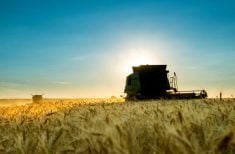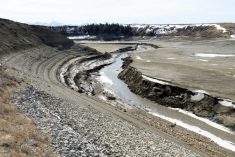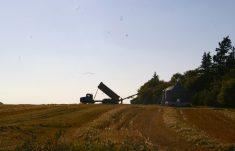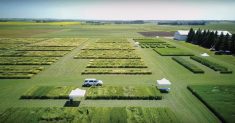Ottawa’s proposals for changes to the AgriStability farm income stabilization program require a yes or no answer from participating provinces, not more discussion, the federal ag minister said Wednesday.
“It has been just over 110 days since we made the offer to the provinces to improve AgriStability,” Agriculture Minister Marie-Claude Bibeau and Winnipeg MP Jim Carr, the federal cabinet’s special representative for the Prairie region, said in a joint statement Wednesday.
“We are asking for a clear indication from the three Prairie provinces whether they will sign on or not.”
Read Also

Prairie forecast: Potential to turn cool and wet
For this forecast period we are starting off with a large area of high pressure over Ontario and an equally large area of low pressure over the Yukon. The clockwise flow around the Ontario high, combined with the counterclockwise flow around the Yukon low, is creating a widespread southerly flow across the Prairies. This should lead to one more day of warm temperatures across the western Prairies and a couple more days over the eastern half.
To the Prairie provinces’ agriculture ministers, the two MPs asked, “have you taken the proposal to your premiers and to your cabinets? Are they supportive of these changes?”
In the wake of a virtual ag ministers’ meeting in late November, Bibeau went public with a unilateral pitch to eliminate AgriStability’s reference margin limit and boost the program’s compensation rate to 80 per cent, up from the current 70.
Those changes, the MPs said, “could lead to an increased payout from AgriStability of 50 per cent, or $170 million nationally, into the pockets of farmers who need it the most.”
Approval from the provinces, which foot 40 per cent of the bill for federal/provincial business risk management programs, would be required for such changes to AgriStability — specifically, at least two-thirds of the provinces, representing two-thirds of program participants.
It’s possible such changes could be made without any of the Prairie provinces on board, although the cost would be relatively more significant for those provinces. But industry observers say the federal government wouldn’t move ahead without at least one Prairie province’s approval.
That observation gets added cred from Bibeau and Carr’s statement Wednesday, in which they said they’re “awaiting a clear response from all three Prairie provinces to build a strong consensus to enact the proposed changes.”
At the request of the Prairie ministers, the MPs said, they would convene a further federal-provincial-territorial meeting, but “to ensure this is a productive meeting and that we can provide much-needed results for farmers, we would prefer to convene only when ministers have a decision in hand.”
Farmers’ AgriStability enrolment deadline for the coming year is April 30, Bibeau and Carr said, and “we need to implement these changes in advance of that deadline in order to encourage more farmers to sign up, and increase farmer participation in the program.”
Several provinces have said they want to see longer-term changes to business risk management programs — and Bibeau and Carr said Wednesday such changes would be reviewed in consultations on the next five-year agricultural policy funding framework, due to take effect in 2023.
“However, consultations on longer-term fixes to the business risk management suite of programs should not come at the expense of the short-term fixes to AgriStability that farmers are asking for today,” the MPs said.
‘Need clarity now’
Meanwhile, several major federal and provincial farm and commodity organizations lined up Wednesday to back the federal MPs’ stance and call on the Prairie provinces for an immediate yea or nay.
“We understand that the priority of all governments is on COVID-19 vaccination and economic recovery, but we need a consensus on AgriStability as soon as possible to mitigate the economic risks that producers are facing on a daily basis,” Canadian Pork Council chair Rick Bergmann said Wednesday.
“It’s not the time for backyard politics, hog producers across Canada are impacted by inadequate programs… When something is broken in our businesses, homes or farms, we fix it. It’s time we fix AgriStability.”
“We need to have tools that help us better manage the risks of weather, trade and production. The proposed program enhancements will do that and better position the beef industry to contribute to Canada’s economic recovery,” Canadian Cattlemen’s Association president Bob Lowe said in a separate joint release.
“The AgriStability deadline is looming, and Canadian farmers and ranchers are already making their risk management decisions for the year,” Canadian Federation of Agriculture president Mary Robinson said in the same joint release. “There is no time left to wait, we need clarity now.”
Another eleven Alberta crop and livestock producer groups, in a separate joint statement Wednesday, said they agree the changes will provide “immediate improvements to the program for producers’ benefit” but also recognize the proposal “is not a long-term solution.”
However, they added, “accepting the current proposal would offer Alberta’s producers meaningful changes that will serve as a bridge to the next policy framework in 2023.”
For their part, the ag ministers for Alberta and Saskatchewan were quoted Wednesday by the Canadian Press (CP) as saying they want to have that ad hoc follow-up meeting Bibeau and Carr propose, so as to vote on and discuss the proposed short-term changes.
“It is nice to see after all this time that the federal minister is finally willing to bring her provincial and territorial colleagues back to the table to complete this important discussion on enhancements to AgriStability,” CP’s Bill Graveland quoted Saskatchewan’s David Marit as saying. — Glacier FarmMedia Network

















